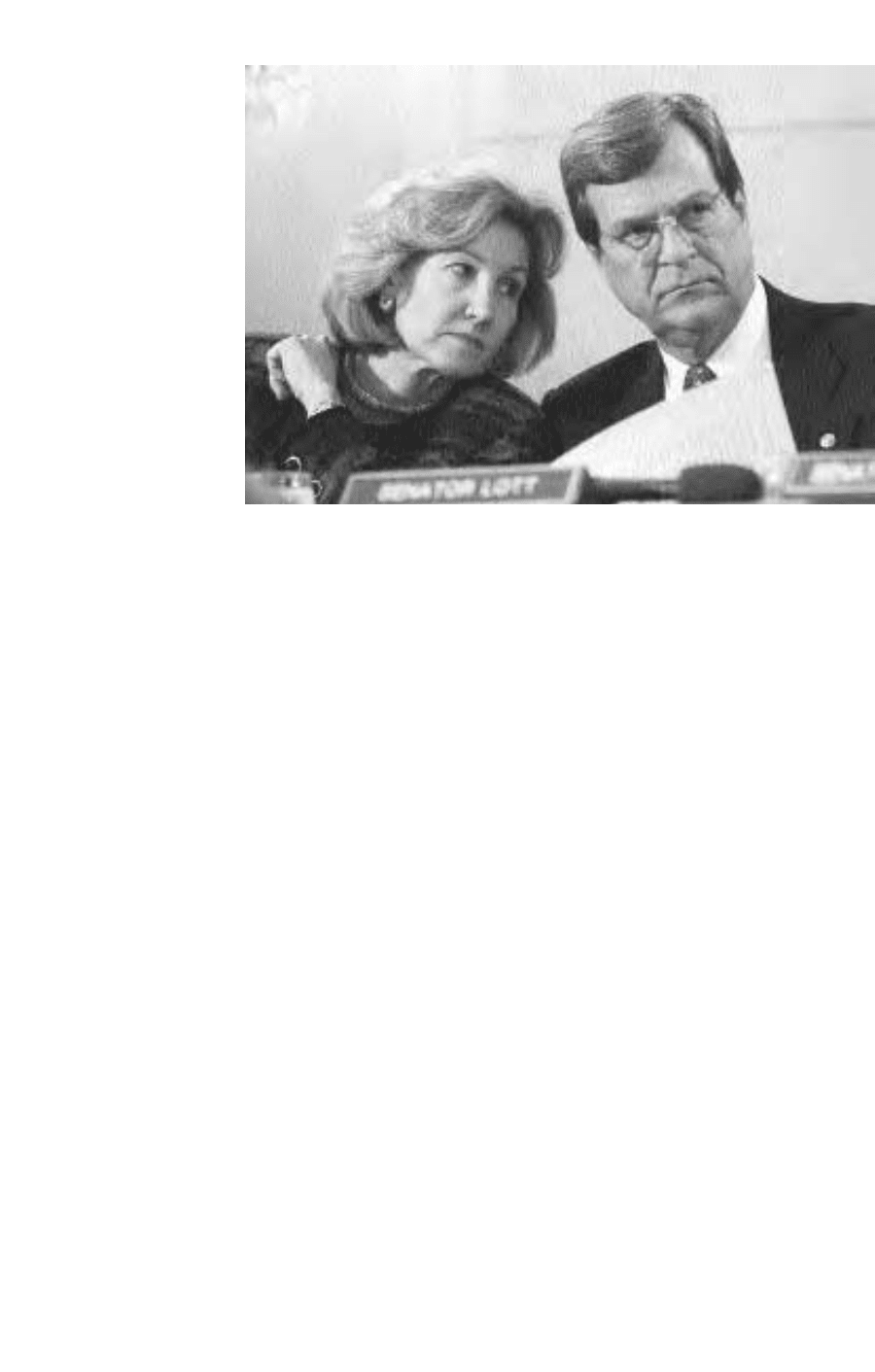Schenken Suzanne O’Dea. From Suffrage to the Senate: An Encyclopedia of American Women in Politics (2 Volumes)
Подождите немного. Документ загружается.


cotting as a nonviolent tactic. I think we showed the world that nonvio-
lence can work to make social change....I think we have laid a pattern of
how farm workers are eventually going to get out of their bondage. It may
not happen right now in our foreseeable future, but the pattern is there
and farm workers are going to make it.”
From 1991 to 1993, she took a leave of absence from UFW to work
on the Feminist Majority’s Feminization of Power campaign, a project
that encourages Latinas to run for public office. She then returned to the
UFW and began organizing the 20,000 workers in California’s strawberry
industry.
Born in Dawson, New Mexico, Huerta earned her associate’s degree
from Stockton College.
See also The Feminist Majority
References Felner, “Dolores Huerta” (1998); H. W. Wilson, Current Biography
Yearbook, 1997 (1997); Garcia, “Dolores Huerta: Woman, Organizer, and
Symbol” (1993).
Hufstedler, Shirley Ann Mount (b. 1925)
The first secretary of the U.S. Department of Education, Shirley Huf-
stedler served from 1979 to 1981. Creating the department had been one
of President Jimmy Carter’s pledges in his 1976 campaign and Congress
had authorized establishing the Department of Education in September
1979. Confirmed by the Senate on 30 November 1979, Hufstedler’s initial
task was to bring together 152 federal education programs previously ad-
ministered by the Defense Department and the Department of Health,
Education, and Welfare. She explained: “The federal government cannot
simply ‘set policy’ in terms of what should be done to help school systems.
The most we can do is to help them help themselves and to try to create a
climate in which people can begin to think in cooperation terms instead
of confrontation terms.” The department officially opened on 4 May 1980.
Born in Denver, Colorado, Shirley Hufstedler earned her bachelor’s
degree in business administration in 1945 and her law degree from Stan-
ford University in 1949. In private law practice from 1950 to 1960, she was
special legal consultant to the California state attorney general. Appointed
to fill an unexpired term as judge on the Los Angeles Superior Court in
1961, she was elected to a full term the next year and served until 1966,
when she was appointed to the California State Court of Appeals for the
Second District. In 1968, President Lyndon Johnson appointed Hufstedler
to the U.S. Court of Appeals for the Ninth Circuit, the second woman to
serve on the federal appellate bench.
Hufstedler chaired the U.S. Commission on Immigration Reform,
which was created by Congress in 1990 and dissolved in 1997.
Hufstedler, Shirley Ann Mount 345

See also Cabinets, Women in Presidential
References H. W. Wilson, Current Biography Yearbook, 1980 (1980).
Hull, Jane Dee Bowersock (b. 1935)
Republican Jane Dee Hull became governor of Arizona on 5 September
1997. Hull entered politics in 1965 as a precinct committeewoman,
worked in Republican campaigns, and served in the Arizona House of
Representatives from 1979 to 1993. In 1989, she served as the state’s first
female speaker of the house and was Arizona secretary of state from 1995
to 1997. Her tenure in the office ended when incumbent Arizona gover-
nor Fife Symington III was convicted of fraud and removed from office.
The state constitution provides that the secretary of state becomes gover-
nor when the office is vacant. Hull was elected governor in 1998 for a
full term.
Born in Kansas City, Missouri, Jane Hull earned her bachelor of sci-
ence degree from the University of Kansas, did postgraduate work in po-
litical science and economics at Arizona State University, and graduated
from the Josephson Ethics Institute.
See also Governors, Women; State Legislatures, Women in
References www.governor.state.az.us/news/html.
Humphrey Brown, Muriel Fay Buck (1912–1998)
Democrat Muriel Humphrey of Minnesota served in the U.S. Senate from
25 January 1978 to 7 November 1978. Her life as a political wife began in
1943, when her first husband, Hubert Humphrey, ran for mayor of Min-
346 Hull, Jane Dee Bowersock
Governor Jane Dee
Hull (R-AZ) was
joined by her grandson
at campaign head-
quarters in Phoenix,
Arizona, to celebrate
her nomination for the
governorship, 1998
(Associated Press AP)

neapolis, Minnesota. She campaigned for him during his many races for the
U.S. Senate as well as his campaign for vice president of the United States
in 1964, which he won, and for president in 1968, which he lost. When he
died in office in 1978, Muriel Humphrey was appointed to fill the vacancy.
In office, Muriel Humphrey passed an amendment to enhance the
job security of federal employees who expose waste or fraud and cospon-
sored the resolution to extend the ratification deadline of the Equal Rights
Amendment. After a granddaughter was born mentally disabled,
Humphrey worked for people with mental disabilities. Humphrey de-
clined to run in the special election to complete the term. She remarried
in 1981 but remained vocal in the political arena. When liberalism and
liberal ideas came under attack in the late 1980s, Muriel Humphrey an-
nounced: “I’m a liberal and I’m proud of it. In fact, I was probably a little
more liberal than Hubert was.”
Born in Huron, South Dakota, Humphrey attended Huron College
in the 1930s, leaving when she married Hubert Humphrey in 1936. She
worked as a bookkeeper in a utility company to put her husband through
college. A shy woman, she strove to overcome her shyness as her husband’s
political career developed. After he received the Democratic Party’s nom-
ination for president, she explained: “I just wanted to be a housewife. I
didn’t even know how I’d be a mother. I would have been horrified to have
thought of this.”
See also Congress, Women in; Equal Rights Amendment
References New York Times, 21 September 1998; Office of the Historian, U.S.
House of Representatives, Women in Congress, 1917–1990 (1991).
Hurley, Ruby (1909–1980)
African American Ruby Hurley was known as “the queen of civil rights”
for her work with the National Association for the Advancement of Col-
ored People (NAACP) in the 1950s and 1960s. Appointed youth secretary
of the NAACP in 1943, she directed the organization of youth councils
and college affiliates across the country. Assigned to Birmingham, Al-
abama, in 1951 when the organization opened a southeastern regional of-
fice, she left when the state banned the organization and reopened the re-
gional office in Atlanta, Georgia. She helped investigate bomb threats
made to an NAACP field secretary in Florida in 1951 and the murder of
the Reverend George W. Lee, who was registering African American vot-
ers. She monitored the trial of two white Mississippians accused of mur-
dering Emmett Till, a young African American. Hurley was involved in the
desegregation of the University of Alabama, the University of Georgia,
and the University of Mississippi.
Hurley, Ruby 347

During a sit-in demonstration at a lunch counter in Greensboro,
North Carolina, Hurley cited the Constitution as the basis for her actions
and then explained: “What we’re saying, Mr. White Folks, is this: ‘You
wrote it and all we want you to do is live by it!’”
Born in Washington, D.C., Ruby Hurley graduated from Miner
Teachers College and attended the Robert H. Terrell Law School.
See also Civil Rights Movement, Women in the; National Association for the
Advancement of Colored People, Women in the
References New York Times, 15 August 1980.
Hutchinson, Anne Marbury (1591–1643)
Puritan Anne Hutchinson was born in Alford, Lincolnshire, England; be-
came a member of Puritan minister John Cotton’s congregation in
Boston, England; and with her husband, William Hutchinson, and their
children followed Cotton to colonial Boston in 1634. Cotton preached the
covenant of grace, a belief that redemption came from God’s grace and
that faith provided the basis for salvation. The covenant of works was the
opposing belief, one that espoused that obedience to moral law was the
way to salvation and that one’s outward behavior indicated that one had
been redeemed. Hutchinson interpreted the covenant of grace to mean
that the spirit of Christ lived within each person, leading her to argue that
men and women were equal. People who shared her beliefs were called
antinomians and were charged with heresy by the church.
A midwife and respected woman in the community, Hutchinson’s ad-
vice was sought by other women. Through their conversations, Hutchin-
son realized that some women had accepted the covenant of works rather
than the covenant of grace, in which she believed. To offer women an op-
portunity to speak openly and freely about their beliefs, Hutchinson or-
ganized weekly meetings in her home to discuss, criticize, and interpret the
week’s sermon. So many people, men and women, attended that she initi-
ated a second weekly meeting. As her following grew, one minister attacked
her in his sermons, and she responded by criticizing his theology.
Hutchinson’s challenge to ministerial authority led to her famous
trial, although she was not charged with any specific crime. Her offense was
that she had not accepted the limits placed on women at the time. She was
tried in civil court in 1637 for sedition for leading discussions on sermons
and on her theological ideas, found guilty, and banished. Hutchinson was
tried again before an ecclesiastical court in early 1638 for heresy and was
excommunicated. Anne and William Hutchinson and their children joined
another religious dissident, Roger Williams, in Rhode Island, living there
until 1642 when William died and they moved to New York. Hutchinson
and all but one daughter were killed by Native Americans in 1643.
348 Hutchinson, Anne Marbury

References Cameron, Anne Hutchinson, Guilty or Not? A Closer Look at Her
Trials (1994).
Hutchison, Kathryn (Kay) Ann Bailey (b. 1943)
Republican Kay Hutchison of Texas entered the U.S. Senate on 14 June
1993. When incumbent Texas senator Lloyd Bentsen left office to join
President Bill Clinton’s cabinet, Hutchison won the special election to
complete the term. She won election to a full six-year term in November
1994. Hutchison held the leadership position of Senate deputy majority
whip in the 104th, 105th, and 106th Congresses (1995–2001).
Senator Hutchison has passed a measure creating the homemakers’
individual retirement account. Before passage of the measure, only em-
ployed persons could establish individual retirement accounts, leaving
homemakers who are not employed in the labor market without the op-
portunity to take advantage of the tax savings associated with the accounts.
With passage of the measure, a married person not employed in the labor
market can establish an account and the homemaker and wage-earning
spouse can save for retirement at the same rate as two-income families.
Hutchison also passed a measure that makes stalking across state lines a
federal offense. With Texas and Mexico sharing a border, Hutchison has fo-
cused her attention on reducing illegal immigration and the movement of
drugs across the border. She has worked for campaign finance reform, mil-
itary preparedness and a strong defense budget, simplification of the
process for small businesses to become government suppliers, congres-
sional term limits, cuts in personal income taxes, and a balanced budget.
She held the leadership position of Senate deputy majority whip in the
104th and 105th Congresses (1995–1997 and 1997–1999).
A political and legal affairs correspondent for a Houston television sta-
tion from 1969 to 1971, Hutchison then went to Washington, D.C., to serve
as press secretary to Republican Party cochair Anne Armstrong. Hutchison
returned to Texas and served in the state House of Representatives from
1973 to 1977, where she cosponsored rape reform legislation with Sarah
Weddington. President Gerald Ford appointed her vice chair of the National
Transportation Safety Board in 1976, where she served until 1978, when she
moved to Dallas. She was senior vice president and general counsel of Re-
public Bank Corporation and later cofounded Fidelity National Bank of
Dallas and owned McCraw Candies. She ran unsuccessfully for Congress in
1982. Hutchison served as Texas state treasurer from 1991 to 1993.
Born in Galveston, Texas, Hutchison attended the University of Texas
from 1961 to 1964 and earned her bachelor of laws degree in 1967 from
the University of Texas Law School and her bachelor of arts degree in 1992
from the University of Texas.
Hutchison, Kathryn (Kay) Ann Bailey 349

See also Congress, Women in; Stalking; State Legislatures; Women in; Wedding-
ton, Sarah Ragle
References Congressional Quarterly, Politics in America 1996 (1995); www.
senate.gov/~hutchison/bio.htm.
Hyde, Henry John (b. 1924)
Republican Henry Hyde of Illinois entered the U.S. House of Representa-
tives on 3 January 1975. During his first term in office, Hyde passed an
amendment prohibiting federal funding for abortions except to save the
life of the mother. He has succeeded in attaching the amendment to every
subsequent annual appropriations bill. After the amendment was chal-
lenged in the courts, the U.S. Supreme Court found it constitutional in
Harris v. McRae (1980). One of the most ardent abortion opponents in
Congress, Hyde seeks a constitutional amendment banning abortions ex-
cept to save the life of the mother. Criticized for his exclusion of abortion
funding for pregnancies resulting from rape or incest, Hyde has explained:
“The fetus has committed no crime. Killing the unborn child would be an
admission that there are values superior to human life and I don’t recog-
nize any value superior to human life.”
Born in Chicago, Hyde earned his bachelor of science degree from
Georgetown University in 1947 and his law degree from the Loyola Univer-
sity School of Law in 1949. An unsuccessful candidate for Congress in 1962,
Hyde served in the Illinois House of Representatives from 1967 to 1975.
See also Abortion; Harris v. McRae
References H. W. Wilson, Current Biography Yearbook, 1989 (1989).
350 Hyde, Henry John
Senator Kay Bailey
Hutchison (R-TX),
with Senate Majority
Leader Trent Lott
(R-MS), listened to
testimony during a
Senate Rules
Committee hearing
on campaign fund-
raising, 1997
(Associated Press AP)

Independent Women’s Forum
Founded in 1992 to provide an alternative female voice in political de-
bates, the Independent Women’s Forum (IWF) began informally to sup-
port Clarence Thomas’s nomination to the U.S. Supreme Court. With
about 500 members, IWF espouses conservative views on social issues and
bases its positions on the belief that the family is the foundation of soci-
ety and is the center of most women’s lives.
IWF members include businesswomen, economists, lawyers, teach-
ers, and homemakers who support individual responsibility, strong fami-
lies, and less government. IWF has supported the Virginia Military Insti-
tute’s attempt to remain all-male, Paula Jones’s sexual harassment suit
against President Bill Clinton, welfare reform, single-sex educational pro-
grams, and mandatory testing for human immunodeficiency virus (HIV)
and disclosure of the results. It opposes affirmative action and worked
against the Violence Against Women Act.
See also Affirmative Action; Hill, Anita Faye; Sexual Harassment; United States
v. Virginia; Violence Against Women Act of 1994
References Burkett, The Right Women (1998); www.iwf.org.
Ireland, Patricia (b. 1945)
Patricia Ireland became president of the National Organization for
Women (NOW) in 1991. Ireland became involved in the feminist move-
ment through a personal experience. A flight attendant for Pan American
World Airlines from 1967 to 1975, Ireland learned that the company’s
351
I

health insurance policy covered male em-
ployees’ families but not female employees’
families. She protested the company policy
and contacted NOW for advice. Following
NOW’s recommendations, she successfully
challenged the policy, but only for women
who were heads of households. The com-
pany later granted women the same insur-
ance coverage as men. Years later, Ireland
noted:“The vice president of the labor task
force at Dade County NOW is now the
dean of women lawmakers in the Florida
legislature. I am the president of NOW.
And Pan Am is bankrupt.”
Ireland discovered that she could cre-
ate change; that although laws existed to
protect women’s rights, they were not con-
sistently enforced; and that NOW’s feminist agenda related to her. She also
found satisfaction in having power. Increasingly dissatisfied with the con-
trol that Pan Am exercised over her life as well as that of other flight at-
tendants, Ireland sought new avenues to gain status and power. She en-
tered law school while still working for Pan Am to support herself and her
husband. Following graduation in 1975, she joined a private law firm,
where she worked for twelve years. During those years, she also did pro
bono work for women and through that work learned how legal barriers
limited women’s options and prohibited women from fully exercising
their human rights. Her exposure to the inequities of divorce laws and in-
heritance laws, the crimes of violence permitted under marriage laws, and
the economic travesties perpetuated by businesses and governments con-
tributed to her growing commitment to the feminist agenda.
Ireland’s continued involvement in NOW led to her election as vice
president of the organization in 1987 and her appointment to the presi-
dency in 1991, when incumbent president Molly Yard resigned because of
illness. Controversy over her personal life immediately accompanied Ire-
land’s move to the president’s office. A gay rights magazine article revealed
that Ireland, who had been married for twenty years, also had a woman
companion. Questions of her sexual orientation surrounded her, but Ire-
land resisted engaging in a battle or even fully responding. She explained:
“This is how I live my life and I’m not ashamed. Here I am. Here’s my
whole set of skills. You get the parts of me you like and also the parts that
make you uncomfortable. You have to understand that other people’s
comfort is no longer my job. I am no longer a flight attendant.”
352 Ireland, Patricia
Patricia Ireland,
president of the
National Organiza-
tion for Women
(Corbis/Bettmann)

During her tenure as president of NOW, Ireland has led its members
in the Women-Friendly Workplace Campaign and has called on corpora-
tions to end sexual harassment and other workplace discrimination.
Through her leadership, NOW initiated an innovative lawsuit using rack-
eteering laws to stop attacks on abortion clinics. The case, Now v. Scheid-
ler, went to the U.S. Supreme Court and was decided in NOW’s favor. Ire-
land developed NOW’s Elect Women for a Change campaign in 1992 and
the organization’s Victory 2000 campaign to elect 2,000 new feminists to
office by the turn of the century. She also enhanced NOW’s involvement
in international issues by nurturing its Global Feminist Program, working
with African women to end genital mutilation and with other groups to
end the gender apartheid imposed by the Taliban in Afghanistan. Ireland’s
term as president of NOW ends in the year 2001.
Born in Oak Park, Illinois, Patricia Ireland earned her bachelor’s de-
gree in German from the University of Tennessee in 1966 and her law de-
gree from the University of Miami Law School in 1975. Ireland wrote her
memoir, What Women Want, in 1996.
See also Feminist Movement; National Organization for Women; NOW v.
Scheidler
References Ireland, What Women Want (1996); New York Times, 3 March 1992;
www.now.org.
Ireland, Patricia 353

